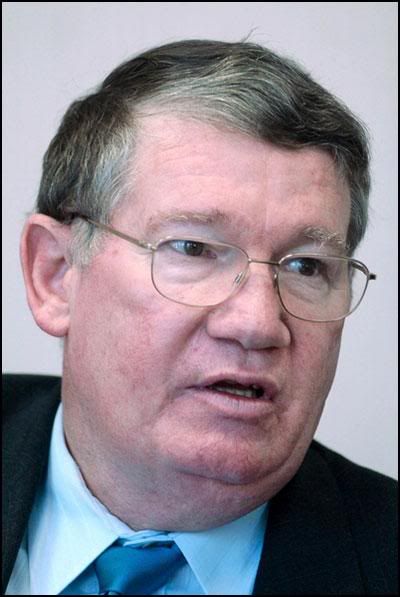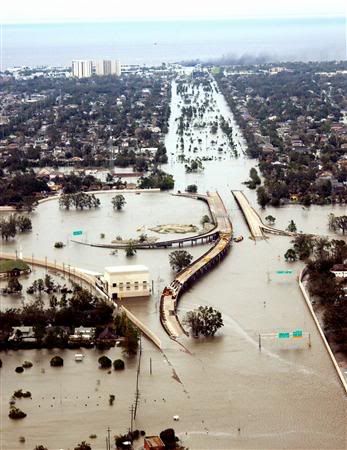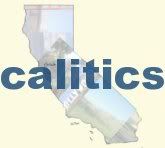San Diego has billed itself as "America's Finest City" for decades. Yet, today San Diego stands on the brink of bankruptcy. Twenty-five years of Republican stewardship have created a city that is broke and broken, needing over a billion dollar to remain solvent and billions more to repair its crumbling infrastructure.
Decades of mismanagement by acolytes of the Reagan Revolution have left San Diego with the new reputation as "America's Cheapest City."
The San Diego Union Tribune chronicles the financial collapse of America's eighth largest city in a feature report in its Sunday edition.
"We've had a culture in this town for years of, 'Don't tax me,' " said Steve Erie, a political science professor at the University of California San Diego. "It's one of the things that got us in this mess. Taxes are the third rail of recent San Diego politics. Touch it and you're dead, yet someone has got to step on the tracks."
Although the roots of this anti-tax culture go deep in the sandy coastal soil, San Diego is the double victim of the Reagan Revolution of late 1970s and early 1980s. The most obvious impact of Ronald Reagan's tenure as governor of California was his legacy legislation, Proposition 13, passed by voters after Reagan left office, with his enthusiastic support.
"Overnight, property taxes statewide were capped at 1 percent of assessed value. Cities saw their revenue drop by as much as 60 percent and have been trying to recover ever since. The situation worsened in later years when the state in 1992 began diverting cities' and counties' property tax revenue to schools.
"From Prop. 13 on, it was a daily struggle," said former City Manager John Lockwood, who was with the city for four decades. "We didn't have the revenue, but we were adding programs."
The secondary fallout of the Reagan era was the acendancy in San Diego of a Republican leadership structure fully supportive of every one of Reagan's bogus fiscal schemes. While Ronald Reagan was pushing to reduce government revenue on the state and then the national level, a generation of San Diego politicians were following in his footsteps, at least rhetorically.
Starting with Pete Wilson and extending through recently resigned, Wilson protégé, Dick Murphy, San Diego has been led by a collection of anti-government, anti-tax, Chamber of Commerce boosters, who have never been able to muster the required political nerve to place hard choices before the voters.
"San Diego has always had a champagne appetite and a beer budget," said John Fowler, a former assistant city manager who was with the city from 1960 to 1988.
"During my early years, ... we tried to do everything in the least expensive way possible – our public improvements, grading. There was even an aversion to charging developers any amount of money (for public facilities). If we can't do it ourselves, we said, we shouldn't charge the developers."
"San Diego may have had a taste for big-ticket programs and initiatives, but when it came to basic services, elected leaders have been penurious. The police force has one of the slimmest ratios of officers to population among the nation's larger cities, and the fire and police departments regularly complain about obsolete, aging equipment."
City leaders seldom demonstrated any courage in addressing the financial shortcomings of the San Diego system. Massive population growth and private development combined with low unemployment, extensive military spending and rapidly expanding tourism to allow civic leaders to avoid tough decisions.
"While other metropolitan areas have devised lucrative fees and taxes like admission taxes, rental car fees and levies on users of electricity, gas and cable TV, San Diego has been loath even to ask voters for permission to charge for residential trash collection.
On average, San Diego's general fund takes in about $546 annually from each of its 1.3 million residents. That is less per capita than most of California's major cities, according to a Union-Tribune study of data from California Controller Steve Westly's office."
While the leaders of other California cities found ways to pay for public services and improvements, San Diego's leaders avoided placing even the most basic financial requests before voters.
"Faced with deep budget cuts in February 1990, the council considered as many as five revenue-raising measures, including a repeal of the People's Ordinance [a 1919 law prohibiting the city from charging for trash collection] and a 5 percent tax on commercial and industrial users of various utilities like gas and electricity.
By the following month, the council had reversed course on all but one, a $25 million bond issue to complete a public safety communications system, which ultimately was approved by voters.
In 1992, the council voted to ask San Diegans to begin paying for trash collection. A week later, the council withdrew the measure, saying it was responding to an angry public.
In what became a running joke at City Hall, the council tried a third time – in 1993 – to get the trash measure on the ballot. Within a couple of weeks, the council had backed down again."
Not only would city leaders fail to muster the courage to ask San Diego residents to pay for trash collection, they would also fail to take any action that might cause the San Diego business community any financial discomfort.
"One of the most common strategies was to impose a utility users tax, which was done in Los Angeles, San Jose, Sacramento, Long Beach and San Francisco. That tax became the third-largest source of tax revenue for cities in 1995, accounting for about $1.2 billion, according to the Public Policy Institute of California. Not so in San Diego. Elected leaders headed in the opposite direction, once passing a motion that directed the city manager never to mention "utility" and "tax" in the same sentence in a manager's report, McGrory said.
Meanwhile, Los Angeles and San Francisco increased their hotel room tax to 14 percent, but in San Diego, recent ballot measures seeking to raise the current room tax of 10.5 percent failed, making it one of the lowest rates in the state among large cities. The last time San Diego raised the tax was 11 years ago, when the council boosted it by 1.5 cents on the dollar to help pay for the convention center expansion and a proposed downtown sports arena, which was never built."
Of course, with the city spending more than it was collecting, the money had to come from somewhere. With city politicians unable to tell voters that they couldn't afford city services and, with those same politicians unwilling to address additional revenue streams, the only option left was to start taking money from the city itself.
"Forget San Diego's civic-boosting sobriquet, "America's Finest City." Jack McGrory, a former city manager who saw the councils regularly vacillate on taxes, is fond of calling San Diego "America's Cheapest City."
[...]
"This isn't rocket science. You can't continue to add services and not have revenues for them."
In order to cope with the soaring annual costs of the pension system and provide relief to a city budget battered by a recession, McGrory devised a financial strategy in 1996 that began the pattern of underfunding the retirement system while increasing benefits. He points out that his plan included a safety net requiring a balloon payment if the fund's assets fell below a certain level.
Six years later, on the advice of his successor, former City Manager Michael Uberuaga, the City Council continued the underfunding but ignored the safety net trigger.
McGrory, who now oversees real estate investments for Price Entities, has said his plan was "fiscally responsible" because of the safety net. However, a law firm hired by the city reported last year that the balloon payment, initially thought to be $25 million, would probably have been closer to $500 million for 2004 and 2005."
With the need to cover $1.4 billion to restore the money taken from the city's pension system, continue to provide public services and find more than the more than $3 billion required to repair and upgrade its worn out infrastructure, it is hardly a surprise that the question of bankruptcy is a major issue in the city's current mayoral campaign.
The city's bond rating is below the "junk" level, so additional borrowing isn't feasible. If the real estate bubble bursts, or even just leaks a bit, city revenues will decline to a level that will force either wholesale cuts in services, massive tax and fee increases or bankruptcy. Still San Diego politicians can't muster the courage to face tough choices.
"No question, San Diego is being governed by a council nervous about the prospect of raising taxes or fees, said Deputy Mayor Toni Atkins.
"The council doesn't want to put taxes on the ballot, nor raise taxes," she said. "None of the mayoral candidates would talk about it either. The council hasn't had the political will to be honest with the public about what we can afford to do and what we can't."
San Diego isn't an isolated incident. It is an object lesson. What Republicans did in San Diego is what they are doing on the national level. Tax cuts without comensurate reductions in government services. Government funded by borrowing money collected for retirement benefits. It's the same pattern and it's cut from that same old cloth.
































